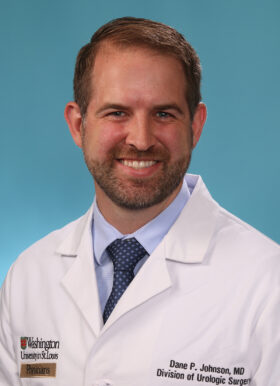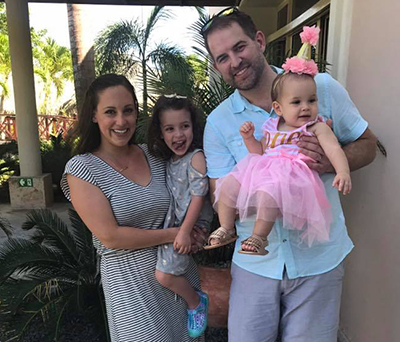Dane Johnson, MD

Dane Johnson, MD, is a specialist in urologic surgery and male factor infertility. His areas of clinical interest include vasectomy reversal, varicocele, testicular pain and penile curvature (Peyronie’s Disease).
Please call 314-362-8200 for an appointment.
What happened in the course of schooling to influence you to choose your specialty?
My career in urology was set in motion during medical school, when I was shadowing a male infertility urologist. Throughout my time in the clinic and with the specialist I was witness to very personal conversations. I was inspired by the level of compassion and understanding demonstrated to couples who were looking to their doctor for clarity and hope during their struggle to get pregnant. I realized the importance of identifying sources of confusion or misunderstanding, and using this to teach patients the reasoning behind treatments.
I saw how taking just a little extra time to fully listen to a patient’s story can set the foundation for a strong patient-physician personal relationship. In fact, these early experiences helped steer me to my fellowship training in male infertility, andrology and sexual health.
Can you describe your specialty?
I am an urologist by training – urologists treat a variety of medical conditions that include kidney stones, kidney stone pain, infertility, sexual health and erectile dysfunction, as well as complex problems like kidney cancers and prostate cancer. During my general urology training, I found a very strong attachment to the subspecialty of treating infertility and helping couples get pregnant.
Male infertility treatments include vasectomy reversals as well as testicular biopsies and treating varicoceles (enlarged veins in the scrotum that can cause low sperm production and decreased sperm quality). During my fellowship training, I was also exposed to a variety of sexual health concerns including erectile dysfunction, as well as issues with ejaculation. I found all my patients have a similar desire for help for a very private and personal problem.

What brought you to Washington University?
I’m a Midwestern boy – raised in Minnesota. My medical training was at the University of Minnesota and I did my residency and fellowship training in Milwaukee, Wisconsin. I had never been to St. Louis before I interviewed for this position.
Washington University School of Medicine is nationally and internationally renowned for providing world-class health care. This environment is ideal for my area of expertise, as many of my new patients are referred from other urologists in the state or region.
Before I came to Washington University, there wasn’t a specialist here who could treat the unique and sensitive areas of urology that include infertility/andrology and sexual health. Many patients were told that unfortunately, there was nothing that could be done to help them with their severely debilitating conditions such as chronic testicular pain. I saw this as an opportunity to treat a group of patients that previously had no other options.
There was zero hesitation when I was offered the position to join the division of urologic surgery here.
What new developments in your field are you most excited about?
In the field of urology, there are almost too many to count. One of the more dynamic and interesting new developments involves treatment for chronic testicular pain — physicians across the country are working today to identify the most effective approach to solving men’s chronic pain.
What causes testicular pain?
Unfortunately, in some cases there may be no clear source for why someone starts experiencing testicular pain. Many men come to me with a history of minor trauma or surgery, but many patients cannot recall a single instance of injury to the groin or testicles.
The initial treatment is to reduce inflammation. We have success with non-steroidal anti-inflammatory drugs. However, for some men that is not enough to reduce or eliminate their pain. In these cases I perform a spermatic cord block – which is an injection of numbing medicine. There are additional medical treatments, including surgery that can also be considered.
What services do you offer to treat male infertility?
Partnering with the Obstetrics and Gynecology department and Fertility and Reproductive Medicine center here, my patients include those couples who are having difficulty getting pregnant, as well as men who have had vasectomies and want them reversed.
Another option to vasectomy reversal is a testicular biopsy. In this procedure we go directly to the source (testicles) to retrieve sperm. The procedure is a little more complex than the vasectomy, because the sperm I retrieve can only be used for in vitro fertilization (IVF).
We also offer the testicular biopsy to couples who have had trouble conceiving, and testing shows there is zero or low sperm count. This procedure offers them a chance of getting pregnant.
What are the success rates of vasectomy reversal?
A vasectomy reversal is relatively complex, and there are many factors that affect a couple’s chances of getting pregnant after the procedure. The number one factor is whether we can reestablish a connection between the testicles and the ejaculate. If we are successful in reestablishing this vas deferens reconnection, there is a 90-95% chance of sperm getting back into the ejaculate. And pregnancy rates can be as high as 50%, depending on the couple.
However, if during surgery I find a secondary obstruction blocking the sperm, I would perform a more complex procedure that not every vasectomy reversal specialist is trained to do — called vasoepididymostomy. The success rates of getting sperm back into the ejaculate after this operation are 60-65%.
One of your areas of interest is Peyronie’s Disease. What is this?
Men can develop scar tissue that leads to an altered erection that is usually curved as upwards as 90 degrees. This condition prevents them from being able to initiate sexual intercourse. I provide an array of treatments that include medical as well as surgical options.
Is there one aspect of your practice that is most interesting?
One of the great things about my field is that new developments occur every year. These include exciting findings in terms of genetic and epigenetic (non-genetic influences that switch genes on and off) causes for infertility, as well as the emergence of assisted reproductive technologies to help couples get pregnant.
One of the more dynamic and interesting changes in my practice has been the recent development of new biomedical technology for treating chronic testicular pain.
Where are you from?
I was raised in Minneapolis, Minnesota, where I attended both undergraduate and medical school at the University of Minnesota. I did my urology training at the Medical College of Wisconsin in Milwaukee, Wisconsin and I stayed for my fellowship training in male infertility, andrology and sexual health. My mentors were Drs. Jay Sandlow and Amy Guise. I joined Washington University faculty the summer of 2017.
How do you like St. Louis so far?
I’ve fallen in love with the city. I’ve made it to a few Blues and Cardinals games – even got myself a Blues jersey! I find that the city and the community have been extremely welcoming to myself, my wife and our two young children.
It’s been very fun to find all the different opportunities to explore –whether it’s the free museums or the free zoo. We’ve met many young families who have quickly become our friends.
Is there a particular award or achievement that is most gratifying?
As a medical student, I was awarded membership into the Gold Humanism Honor Society, which is an honor society dedicated to supporting compassionate, collaborative and scientifically excellent care. I was elected by my peers and mentors, and recognized for demonstrating “excellence in clinical care, leadership, compassion and dedication to service.” This is an honor I have proudly carried throughout my career in medicine, and has been a source of motivation in my practice.
What is the best advice you’ve received?
“Believe in yourself. Do not let the possibility for failure hold you back.” I don’t know if my parents ever said those words specifically, but this certainly was their overall theme for raising me and my older brother.
If you weren’t a doctor, what would you like to be doing?
I have always considered myself a teacher first, and physician second. I often felt that if I had chosen a different path in life, that path would have led to a life in education. I sometimes imagine myself teaching biochemistry to high school or college students.